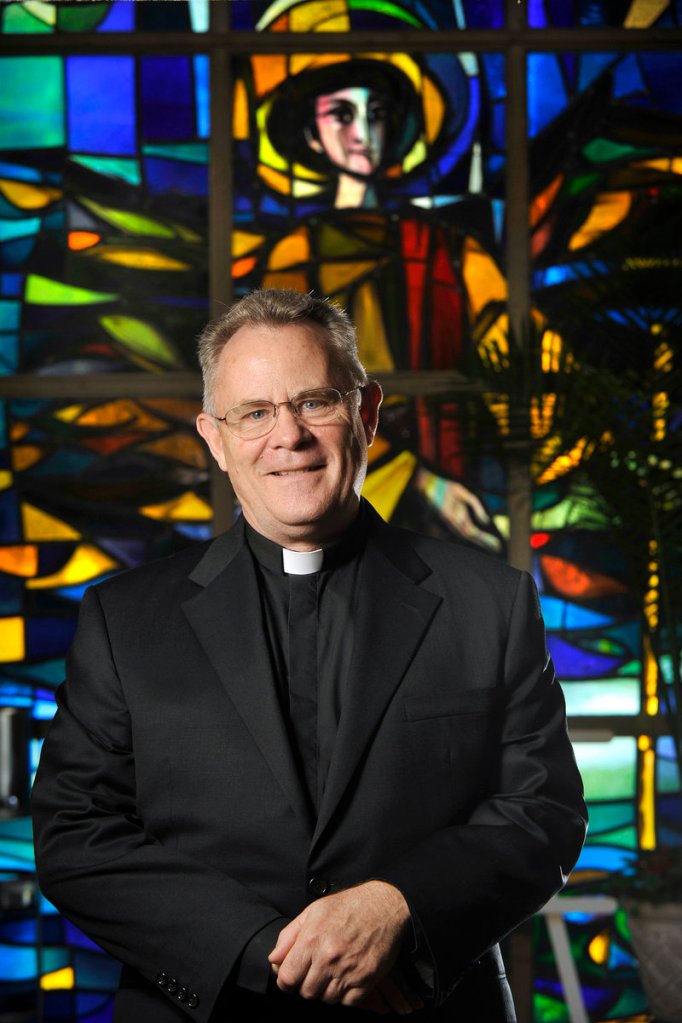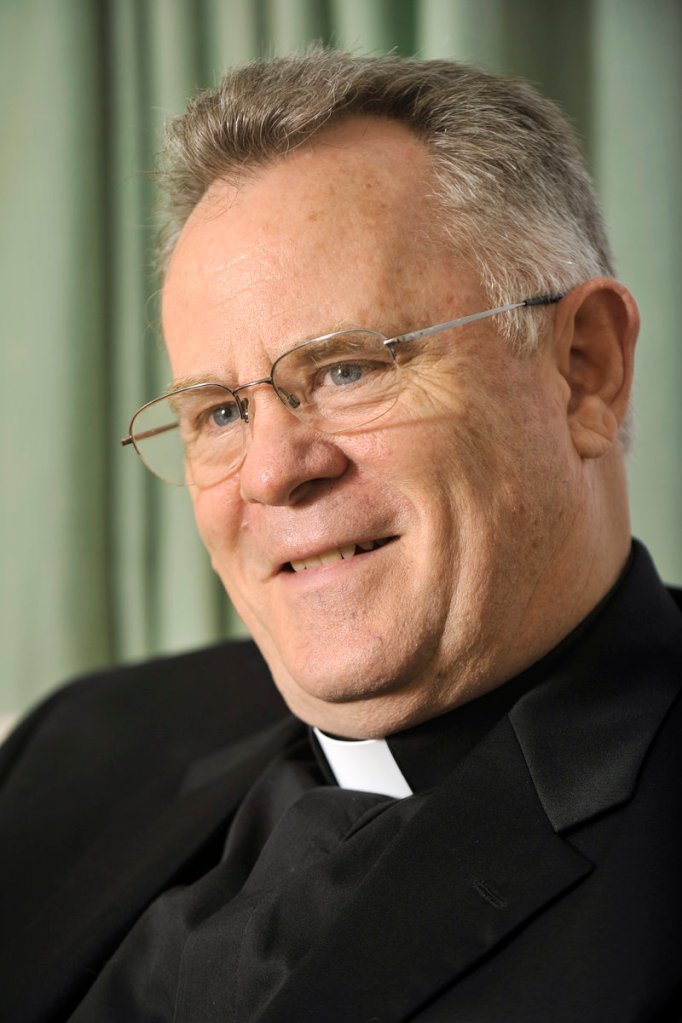When David Affleck was ordained earlier this month as Maine’s newest Roman Catholic priest, his wife, Katherine, sat in the pews at Portland’s Cathedral of the Immaculate Conception.
Two of his four grown children were there as well.
Wait, what?
A Catholic priest who’s married? With children? That can’t be right.
Except it is.
Affleck, 62, of York, is a former Episcopal priest who took advantage of a 1980 papal provision that allows him and others like him to become priests in the Catholic Church.
Only a handful of such ordinations take place in the U.S. each year. In Maine, it’s happened just three times in 32 years, and Affleck is the only current convert. One died, and the other has left the church.
“It is indeed rare for a pastoral provision to be sought and granted,” Bishop Richard Malone said in a statement. “The Church takes a great deal of time and energy to know that the man in question is truly being called to the priesthood and completely understands the responsibilities and ministry within the Catholic Church.”
The trend, however small, is less a reflection of relaxed requirements of the Catholic Church and more a sign that fewer men are joining the priesthood, said Monsignor Michael Henchal, a Catholic priest in Maine for nearly 40 years. Aside from Affleck, only one other priest has been ordained this year. There are now more retired priests in Maine (86) than active priests (69). Affleck is needed.
That’s not to diminish his resume. He has a master’s degree, a doctorate and more than 15 years of priesthood under his collar. When parishioners of St. Raphael in Kittery, St. Christopher in York or Our Lady of Peace in Berwick see Affleck at the front of their church, reading Scripture and offering Communion, they see a man of distinction and conviction.
Some may not even realize he hasn’t taken the vow of celibacy that traditional Catholic priests must take.
“People have been very welcoming, they have been accepting,” he said during an interview last week at his modest parish office in Kittery. “If there are people who are bothered by this, they haven’t said so.”
Mitch Picard of York is a parishioner at St. Christopher and the current chairman of the parish council. He said he hasn’t heard from any parishioners who have objected to Affleck’s ordination or his background.
“It almost went unnoticed because he was a deacon for a year,” Picard said. “Now, he just has a different role at the altar.”
A SHIFT IN FAITH
Affleck’s journey from the Episcopal Church to the Catholic Church is nuanced, but he speaks of it thoughtfully.
As the son of an Episcopal priest, he avoided temptation in his youth to follow in his father’s footsteps. Instead, he worked as a carpenter throughout his 20s, building homes to accommodate California’s population explosion. Then he earned a degree in finance and accounting at night school. That led to a career in the public sector, where he rose to the rank of deputy treasurer for the city of Sacramento.
It wasn’t until the early 1990s, when Affleck was into his 40s, that he decided to make the priesthood a profession. He followed his father anyway.
“I felt like that is the direction I was being led,” he said, as though the choice was not entirely his.
So he went to divinity school and took the steps he needed to take to become a priest in the church in which he was raised. He presided over parishes in Folsom County and then Woodland, Calif., as his children grew.
Once they left the house, he and his wife moved across the country to Saugus, Mass., to take over an Episcopal parish there.
That’s where things started to change.
It was in Saugus that Affleck met a man, the town’s youth and recreation director, who traveled in the same circles he did. They became friends. Soon, they convened a regular morning prayer group in town that grew to about seven people, all civic leaders, all Catholic. Affleck, as the lone Episcopalian, was drawn in by their prayer. It moved him.
He began reading the church’s cathechism — a summary of teachings.
Around the same time his faith was being challenged, the Episcopal Church — the only church Affleck had known — was going through a transition.
“The church was and still is undergoing a change in its understanding of moral theology and also some of its dogmatic theology,” he said, choosing his words carefully. “And I was growing more and more uncomfortable with that direction.”
There are many similarities between the Catholic and the Anglican faiths. (The U.S. Episcopal Church is part of the loosely organized worldwide Anglican Communion.) At one time, they were the same. Then England broke off because it didn’t like the idea that all decisions came from the pope.
This break eventually led to the Church of England’s expansion to other continents; the group of related churches became known as the Anglican Communion. Catholicism, by definition, is universal, but there is no single “Anglican Church” with authority over all churches.
More recently, a growing faction of this country’s Episcopal Church has moderated its stance on social issues. Birth control has become acceptable. Women can now be ordained as priests. New Hampshire’s Gene Robinson made headlines when he became the first openly gay Episcopal priest to be ordained as a bishop. And the dominant social issue of today — same-sex marriage — is becoming more accepted among Episcopalians.
Affleck said iftwasn’t any one issue that clarified his faith but he simply reached a point where he felt he needed to be in the Catholic Church because it, “represented those things that I always felt were true but that weren’t quite consistent in the Episcopal Church.”
A PRIEST WITH LIFE EXPERIENCES
Just as some have left the Episcopal Church in recent years, many also have left the Catholic Church over its lack of progression on many of the same social issues.
Heidi Shott, spokeswoman for the Episcopal Diocese of Maine, said two of her church’s more vibrant priests were once Catholic and left. Both have since married and started families, something they couldn’t do as Catholic priests.
Monsignor Henchal said that fluidity has always existed, but he hopes Episcopals who are leaving their church for the Catholic Church aren’t doing so in protest over a particular issue — same-sex marriage, for instance — because “those issues come and go.” He doesn’t think that’s the case with Affleck.
Affleck wasn’t entirely sure he wanted to continue being a priest when he officially renounced his vows about five years ago and left the Episcopal priesthood. By then, he and his wife had moved to Maine, to a getaway home they had purchased while living in Massachusetts.
The Catholic Church welcomed Affleck and his wife as parishioners shortly thereafter.
“Honestly, I was enjoying sleeping in, doing my thing,” he said of that period in his life. “But I still felt that call to ministry.”
Affleck was still in his 50s at the time and wasn’t ready to retire. He was aware of the Catholic provision that would allow men like him — married men — to become priests. So, he started that process. He sought out Bishop Malone for his blessing. He began learning about the differences between his former church and his new one. He took classes and wrote essays and sat for oral exams just to be considered. Eventually, Affleck’s paperwork was sent to Rome for review by the pope. Affleck was granted special dispensation.
On June 3, he officially became a priest in the Roman Catholic Church — the only married Catholic priest in Maine.
“I have come to know Father Affleck as a man of integrity and sincere love of Christ and his church, and I am grateful to have had the privilege to ordain him,” Malone said in a statement.
Affleck now has the authority to perform marriages and baptisms. He administers the sacrament of anointing the sick to the dying. He counsels parishioners in crisis.
But unlike other Catholic priests, when Affleck talks to engaged couples, he does so as a man who has experienced the ups and downs of marriage, as a man who can speak about the roller coaster of having children, as a man who knows the joys of intimacy with a woman.
Henchal said he understands how some could feel resentment toward the new priest.
“But I haven’t seen it,” he said. “I think parishioners are more mystified than anything else.”
Picard, one of those parishioners, said it’s too early to tell whether Affleck will have an edge or whether his parish will view him with skepticism.
Sitting in his office in Kittery, Affleck seemed at home and at peace with his decision, although he said he does have one nagging regret: He never got to talk to his father — the Episcopal priest — about his decision to convert to Catholicism. He died long before that happened.
“I would love to have a conversation with him now,” Affleck said. “I would love to debate because we would be debating as equals instead of as father and son.”
Staff Writer Eric Russell can be contacted at 791-6344 or at:
erussell@mainetoday.com
Twitter: @PPHEricRussell
Send questions/comments to the editors.



